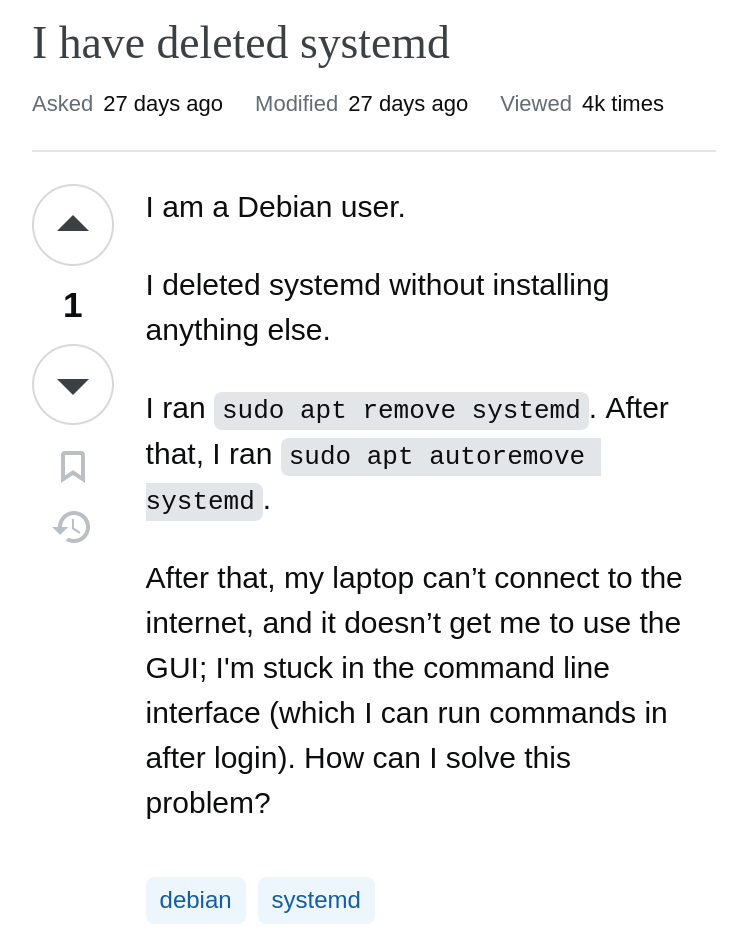this post was submitted on 19 Apr 2024
891 points (98.7% liked)
linuxmemes
30435 readers
1552 users here now
Hint: :q!
Sister communities:
Community rules (click to expand)
1. Follow the site-wide rules
- Instance-wide TOS: https://legal.lemmy.world/tos/
- Lemmy code of conduct: https://join-lemmy.org/docs/code_of_conduct.html
2. Be civil
- Understand the difference between a joke and an insult.
- Do not harrass or attack users for any reason. This includes using blanket terms, like "every user of thing".
- Don't get baited into back-and-forth insults. We are not animals.
- Leave remarks of "peasantry" to the PCMR community. If you dislike an OS/service/application, attack the thing you dislike, not the individuals who use it. Some people may not have a choice.
- Bigotry will not be tolerated.
3. Post Linux-related content
- Including Unix and BSD.
- Non-Linux content is acceptable as long as it makes a reference to Linux. For example, the poorly made mockery of
sudoin Windows. - No porn, no politics, no trolling or ragebaiting.
- Don't come looking for advice, this is not the right community.
4. No recent reposts
- Everybody uses Arch btw, can't quit Vim, <loves/tolerates/hates> systemd, and wants to interject for a moment. You can stop now.
5. 🇬🇧 Language/язык/Sprache
- This is primarily an English-speaking community. 🇬🇧🇦🇺🇺🇸
- Comments written in other languages are allowed.
- The substance of a post should be comprehensible for people who only speak English.
- Titles and post bodies written in other languages will be allowed, but only as long as the above rule is observed.
6. (NEW!) Regarding public figures
We all have our opinions, and certain public figures can be divisive. Keep in mind that this is a community for memes and light-hearted fun, not for airing grievances or leveling accusations. - Keep discussions polite and free of disparagement.
- We are never in possession of all of the facts. Defamatory comments will not be tolerated.
- Discussions that get too heated will be locked and offending comments removed.
Please report posts and comments that break these rules!
Important: never execute code or follow advice that you don't understand or can't verify, especially here. The word of the day is credibility. This is a meme community -- even the most helpful comments might just be shitposts that can damage your system. Be aware, be smart, don't remove France.
founded 2 years ago
MODERATORS
you are viewing a single comment's thread
view the rest of the comments
view the rest of the comments

There is also the argument that it's more complicated under the hood and harder to troubleshoot, particularly because of it's inherent parallelism and dependency-tree design, whereas initv was inherently serial. It was much more straightforward to pick the order in which services started and shut down on an initv system.
For example, say I write a service and I want it to always be the first service stopped during a shutdown, and I want all other services to wait for it to stop before shutting down. That was trivial to do on an initv system, it's basically impossible on systemd.
For those wondering, yes I did run into this situation. My solution was clobbering the shutdown, poweroff, and restart binaries with scripts earlier in path search that stop my service, verify that they're stopped, and then hook back to systemd to do the power event.
I had numerous situations where systemd didn't let me abort a hanging service startup during boot or stop during shutdown.
So what do I do now, systemd? Wait till infinity??
That never happened while using other init systems. Because they simply fail properly ("sorry I did my best to stop this, I needed a SIGKILL finally"). Or simply let me log in: "sorry, some services failed to start and now it's a huge mess, but at least you can log in and fix it.".